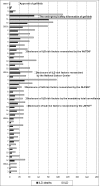Lessons from gefitinib-induced interstitial lung disease in Japan: Problems in approval, pharmacovigilance, and regulatory decision-making procedures
- PMID: 25214906
- PMCID: PMC4155619
- DOI: 10.4321/s1885-642x2006000400004
Lessons from gefitinib-induced interstitial lung disease in Japan: Problems in approval, pharmacovigilance, and regulatory decision-making procedures
Abstract
Objective: The objective of this study was to identify problems in the approval, pharmacovigilance, and post-approval regulatory decision-making procedures involving gefitinib and to propose countermeasures to prevent further drug-induced suffering in Japan in the future.
Methods: We comprehensively reviewed reports regarding gefitinib published during the period from 2000 to 2006 by regulatory agencies, the manufacturer of the gefitinib-containing drug, cancer clinical study groups, and a scientific society.
Results: We identified the following major problems in the approval, pharmacovigilance, and regulatory decision-making procedures: 1) the results of animal experiments and pre-marketing clinical trials, and reports of adverse drug reactions from other countries were not properly reflected in the label; 2) indications for the drug were expanded without strict evaluation of the external validity of pre-marketing clinical trials; and 3) despite many serious cases of interstitial lung disease (ILD) being spontaneously reported, well-designed post-marketing surveillance was not immediately performed.
Conclusions: We propose a mandatory total registry of all drug users and surveillance (i.e. a prospective outcome study) as one of the rational solutions for preventing further drug-induced suffering in Japan.
Keywords: Decision making; Gefitinib; Japan; Lung diseases; Product surveillance; interstitial; organizational; postmarketing.
Figures
Similar articles
-
A decade of marketing approval of gene and cell-based therapies in the United States, European Union and Japan: An evaluation of regulatory decision-making.Cytotherapy. 2018 Jun;20(6):769-778. doi: 10.1016/j.jcyt.2018.03.038. Epub 2018 May 2. Cytotherapy. 2018. PMID: 29730080
-
Interstitial Lung Disease as an Adverse Drug Reaction in Japan: Exploration of Regulatory Actions as a Basis for High Reporting.Drug Saf. 2020 Nov;43(11):1121-1131. doi: 10.1007/s40264-020-00968-7. Drug Saf. 2020. PMID: 32617874 Free PMC article.
-
Clinical features and risk factors of panitumumab-induced interstitial lung disease: a postmarketing all-case surveillance study.Int J Clin Oncol. 2015 Dec;20(6):1063-71. doi: 10.1007/s10147-015-0834-3. Epub 2015 May 13. Int J Clin Oncol. 2015. PMID: 25967287 Free PMC article.
-
Post-approval Studies for Rare Disease Treatments and Orphan Drugs.Adv Exp Med Biol. 2017;1031:197-205. doi: 10.1007/978-3-319-67144-4_11. Adv Exp Med Biol. 2017. PMID: 29214573 Review.
-
Postmarketing Surveillance Studies-An Industry Perspective on Changing Global Requirements and Implications.Clin Ther. 2017 Apr;39(4):675-685. doi: 10.1016/j.clinthera.2017.03.011. Epub 2017 Apr 7. Clin Ther. 2017. PMID: 28392076 Review.
Cited by
-
Interstitial lung disease in gefitinib-treated Japanese patients with non-small cell lung cancer - a retrospective analysis: JMTO LC03-02.BMC Res Notes. 2009 Aug 5;2:157. doi: 10.1186/1756-0500-2-157. BMC Res Notes. 2009. PMID: 19656374 Free PMC article.
-
A perspective on the benefit-risk assessment for new and emerging pharmaceuticals in Japan.Drug Des Devel Ther. 2015 Mar 31;9:1877-88. doi: 10.2147/DDDT.S62636. eCollection 2015. Drug Des Devel Ther. 2015. PMID: 25848223 Free PMC article. Review.
-
A data capture system for outcomes studies that integrates with electronic health records: development and potential uses.J Med Syst. 2008 Oct;32(5):423-7. doi: 10.1007/s10916-008-9147-7. J Med Syst. 2008. PMID: 18814498
References
-
- AstraZeneca. Selling countries abroad until November 2005. (in Japanese) [accessed 2006 August 2]; http://www.iressa.jp/professional/faq/pro_faq1.asp#01_02 .
-
- AstraZeneca. Information about Iressa tablets 250. (in Japanese) [accessed 2006 August 2]; http://www.info.pmda.go.jp/shinyaku/g020706/index.html?
-
- AstraZeneca. The trend in the incidence of interstitial lung diseases and interstitial pneumonia, February 10, 2003 (in Japanese) [accessed 2006 August 2]; http://www.astrazeneca.co.jp/activity/other/detail/03_02_10b.html .
-
- Ministry of Health, Labour and Welfare. The trend in the incidence of interstitial lung diseases and interstitial pneumonia possibly related to the use of gefitinib reported to Ministry of Health, Labour and Welfare and Pharmaceuticals and Medical Devices Agency: Tabulation by the day of reporting until December 28, 2005. [accessed 2006 August 2];2005 Jan 20; in Japanese. http://www.mhlw.go.jp/shingi/2005/01/dl/s0120-4b.pdf .
-
- Ministry of Health, Labour and Welfare. The reported number of interstitial lung diseases and interstitial pneumonia after gefitinib therapy. [accessed 2006 March 30];2006 Apr 26; in Japanese. http://www.mhlw.go.jp/houdou/2006/04/h0426-1.html .
LinkOut - more resources
Full Text Sources

